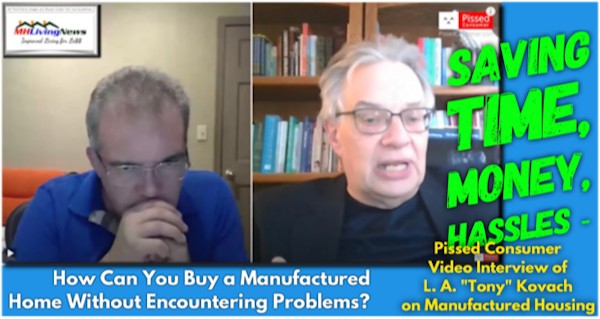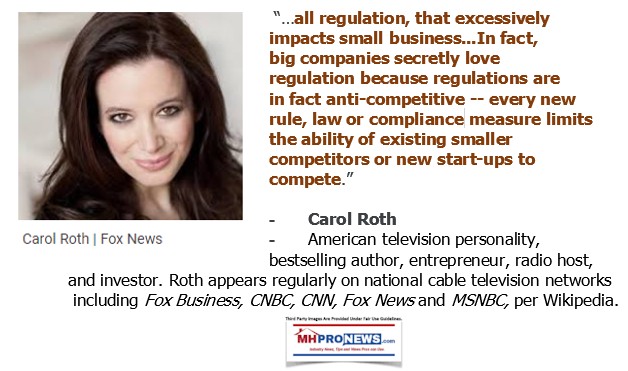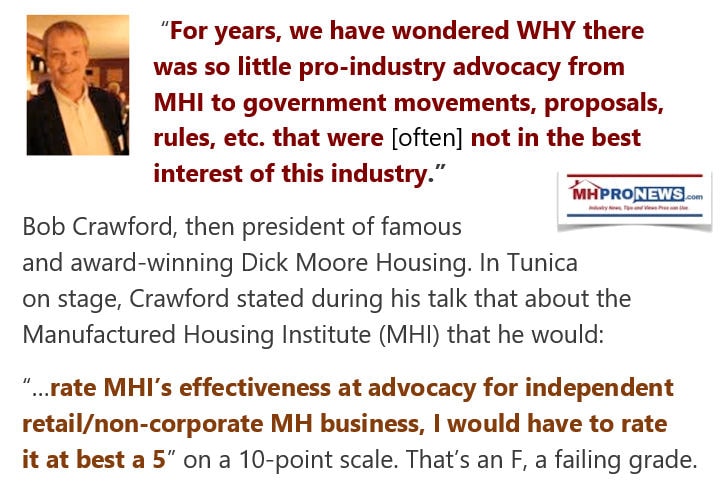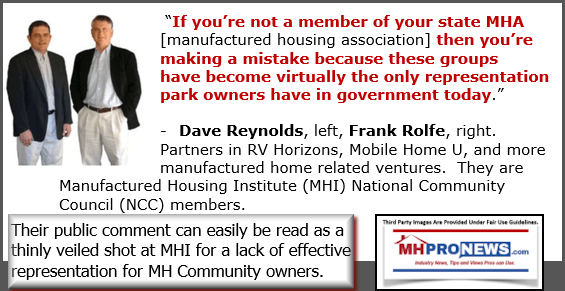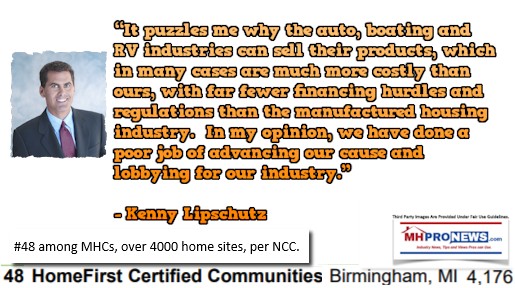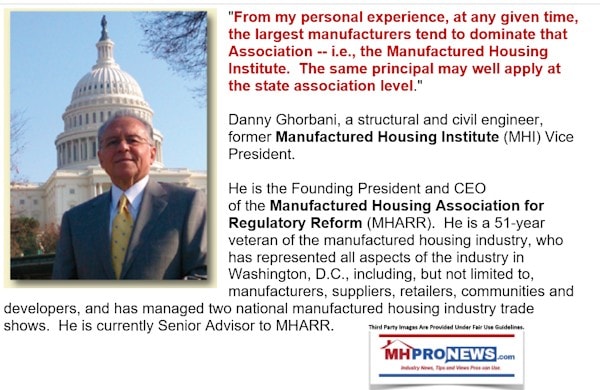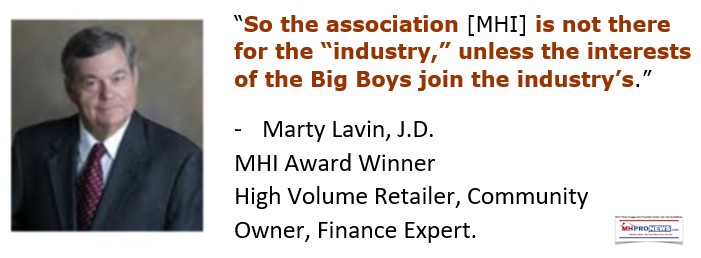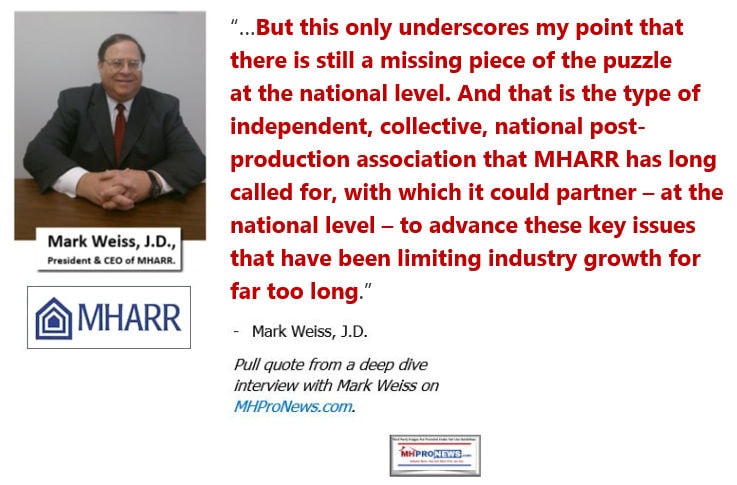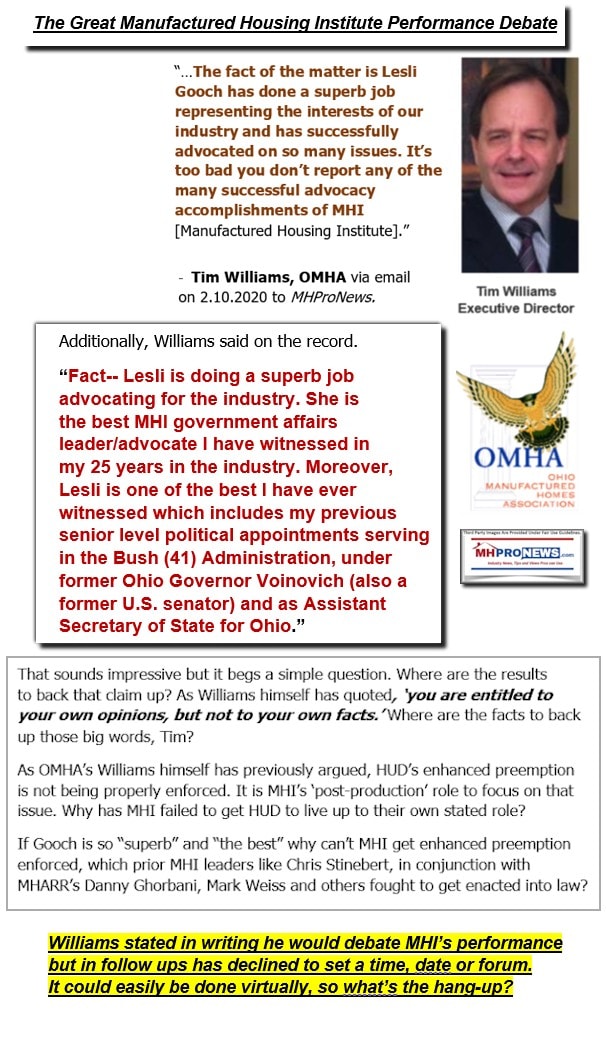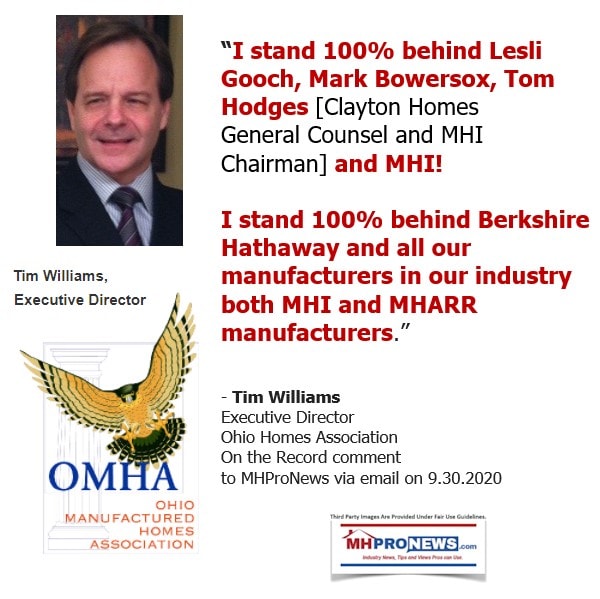From the McGlinchey Stafford law firm, which does legal work for the Manufactured Housing Institute (MHI) and others, and is also a MHI member. The following media release from McGlinchey is from JD Supra on October 2, 2020. Their “industry update” will be followed by additional information, including the debate over MHI/National Communities Council (NCC) performance topic.
Recent Developments Affecting Manufactured Housing

Maryland Introduces Consumer Protections for Manufactured Home Financing
On May 8, 2020, the Maryland Legislature enacted Senate Bill 155 (SB 155), with an October 1, 2020, effective date. (SB 155 was cross-filed with House Bill 93, companion legislation in the House of Delegates.) The legislation introduces several consumer protections in connection with manufactured home financing, including a requirement that lenders must generally serve written notice on a borrower at least 30 days before repossession of a home and an obligation of good faith and fair dealing when retail sellers provide financial information to a prospective consumer borrower.
Other highlights of SB 155:
- Amends the definition of “mortgage loan originator” to exempt manufactured home retail sellers as long as they do not receive compensation or gain for engaging in loan origination activity in excess of compensation or gain received in a comparable cash transaction. (This change more closely aligns state law with changes at the federal level as part of the Economic Growth, Regulatory Relief, and Consumer Protection Act of 2018.)
- Effectively creates a mini-consumer Bill of Rights that says manufactured home retail sellers:
- Have a duty of good faith and fair dealing when providing financial information to a prospective consumer borrower;
- May not steer a consumer borrower to a financing product that offers less a favorable terms; and
- Must provide a written statement describing any corporate affiliation between the retailer and a financing source, if such a relationship exists.
- Amends the definition of “mobile home” to align more closely with the federal definition under the Manufactured Home Construction and Safety Standards Act.
- Codifies the definition of “dwelling,” instead of cross-referencing the federal definition in the Truth in Lending Act.
This legislation was originally introduced during the Maryland Legislature’s 2019 Session as part of Senate Bill 786 (SB 786), the Financial Consumer Protection Act of 2019—a much larger bill focused on creating a state-level CFPB. SB 786 ultimately died in Committee. However, during the 2020 Session, the consumer protection components of SB 786 applicable to manufactured housing were repackaged as SB 155, which was introduced earlier this year.
HUD OMHP Assumes Responsibility for Pennsylvania’s Installation Program
On October 1, 2020, the U.S. Department of Housing and Urban Development’s (HUD) Office of Manufactured Housing Programs (OMHP) assumed responsibility for the installation of manufactured homes in Pennsylvania. Last September, in response to budget concerns, the Pennsylvania Department of Community and Economic Development (DCED) first announced plans to modify the state’s installation program.
The transition to HUD’s Manufactured Home Installation Program began last October. Since then, the DECD has stopped offering installer training and discontinued its state certification program for home installers. Current Pennsylvania Manufactured Home Installers Certifications will remain in effect until the expiration date indicated on the certificate. However, persons interested in installing (or continuing to install) homes in Pennsylvania must now comply with the federal program as administered by HUD. This requires completion of a HUD-approved training course and the HUD Manufactured Home Installer License Application (see Form HUD-307).
New homes sited in Pennsylvania must still be installed to the manufacturer’s installation instructions and meet the HUD Code’s minimum standards. However, beginning October 1, 2020, installers must report to HUD every home installed and must certify that the installation was inspected by a HUD-certified inspector (see Form HUD-309). Likewise, retailers will begin submitting monthly reports to HUD summarizing the number of homes sold and installed (see Forms HUD-305 and HUD-306). Retailers must also update any required disclosures to now reference the HUD Manufactured Home Installation Program.
Keep in mind these program changes generally do not affect the relocation of existing construction in Pennsylvania. HUD does not regulate the relocation of manufactured homes, so any relevant state requirements still apply.
ICC Finalizes 2021 I-Code Updates
Later this month, the International Code Council (ICC) will release the 2021 edition of its International Codes (I-Codes), including updates to the International Building Code, the International Residential Code (which includes Appendix E “Manufactured Housing Used as Dwellings”), and the International Energy Conservation Code, as well as updates to the fire and plumbing codes. Altogether, the ICC’s 2021 update includes revisions to 14 different code standards with an overall focus on energy efficiency, conservation of resources, and the impact of energy usage on the environment. Unsurprisingly, for energy advocates, several updates did not go far enough, while homebuilders are concerned the revisions are too restrictive and will affect affordability.
Understanding how the I-Codes affect state and local code requirements is critical for manufactured home builders. The ICC and its committees update the I-Codes on three-year cycles, with adoption by state and local jurisdictions usually trailing a few code cycles behind. While the I-Codes are only models and not legally binding, eventually most U.S. jurisdictions at the state and local levels will either adopt the codes as written or with amendments. As a result, the I-Codes are a reliable tool for gauging future home building and manufacturing requirements.
Because federal preemption is a cornerstone of the Manufactured Home Construction and Safety Standards Act (as implemented through the HUD Code), manufactured housing is exempt from state and local code enforcement. However, preemption is exclusive to the HUD Code’s Construction and Safety Standards, not the Installation Standards. Further, when certain aspects of construction are completed on-site or when the HUD Code is silent on a particular issue, state and local requirements may come into play. It is also not uncommon for the Manufactured Housing Consensus Committee, the federal advisory body that provides recommendations to HUD for revising and interpreting the HUD Code, to reference the I-Codes where appropriate.”
## End of release from JD Supra ##
Additional Information, MHProNews Analysis and Commentary
I. Problematic presentation of certain details in the above alleged.
First, it is important to note that McGlinchey Stafford work with, and for, MHI. It is therefore a given that what they say reflects MHI influence.
An informed source said that while much of the information is ‘technically correct,’ the way it is phrased in the JD Supra release opens the door to a weakening of aspects of the Manufactured Housing Improvement Act (MHIA) of 2000 law that are beneficial to manufactured housing professionals, consumers, and taxpayers.
For instance:
1) Construction standards vs. installation. While technically correct, the statements in JD Supra when HUD Code is silent, couches it carefully, may come into play. The phrasing narrows preemption.
2) A specific example would be fire sprinklers. Required by “I-Codes,” they are not mandated by HUD Code standards. The data from the NFPA, reported by MHLivingNews and MHProNews, reflects that fire safety of manufactured home residents are not compromised, because the code is implemented in a way that addresses fire safety effectively without sprinklers. This might be called ‘implied preemption’ on issues that the HUD Code is ‘silent’ on.
3) MHI’s position has been that the industry needs a specific fire sprinkler standard in HUD Code. MHI is not known to have argued implied preemption. This writer, while an MHI member, specifically raised this issue of fire sprinklers in an MHI meeting, arguing against MHI’s thinking. While it caused a stir, there was no strong comeback made publicly.
4) The McGlinchey/MHI argument opens the door to problematic areas by conceding too much. After all, why should manufactured housing make such concessions that could undermine the possibility of implied preemption on any number of issues? The impact would be costly and time consuming.
6) It is worth noting, as MHProNews previously reported, that NTA was bought by the ICC. See that related report by clicking the image or headline linked below.
7) Regarding the McGlinchey/MHI mention of the Federal Advisory Committee, it is technically correct. The Federal Advisory Committee Act (FACA) provides certain legal safeguards that are useful.
8) So, the MHCC is technically a FAC, which is stated in the law. That said, the 2000 reform law (MHIA) properly interpretated, gives the MHCC specific authority not conveyed to other FACs. Substantive powers, as a FAC, are defined by the 2000. Not all FACs have that level of power.
Summed up, these interpretations could minimalize scope and benefit to manufactured housing of 2000 law. One must bear in mind that as a practical more onerous or complex regulations benefits larger companies.
Our August 14, 2019 MHProNews report on the NTA being acquired by ICC said in part why that deal was being reported for possible future analysis and reporting. “Because HUD Code industry research of the last few years have revealed a variety of ways that manufactured housing potential has been thwarted, often via weaponized operations. To be clear, there is no specific evidence currently that such is the case with this NTA ICC deal.” That may be coming into greater focus, given the McGlinchey/MHI rundown, noted above.
II. MHI Effectiveness and Performance Debate Issue
The following email was sent to Lesli Gooch, Tim Williams/21st, Tom Hodges/Clayton Homes, MHI Chairman, Tim Williams/OMHA at about 7:11 AM ET on 10.7.2020.

Lady and Gents,
We have a new Manufactured Housing Institute (MHI) connected tipster who has stepped forward, but let’s set that aside for a few moments.
MHProNews reader feedback indicates the desire for a debate on MHI’s behaviors and effectiveness in its purported advocacy on behalf of “all segments” of the manufactured housing industry.
As you know, Tim Williams/OMHA has attempted to use MHI as cover for not doing a live debate. Even MHI/NCC is doing virtual events. Why not a virtual debate? Or why not accept that university professor’s invitation for them to moderate a live debate?
MHI and it’s corporate leaders are either confident in the soundness, ethics, or legality of their respective behavior in manufactured housing — or they are not. It’s really that simple, isn’t it?
You have attorneys, people with degrees, as well as professionals with years of experience. Are none able or willing to defend their ‘leadership’ against the various allegations of market manipulation, deceptive trade practices, conflicts of interest, and other concerns that have been raised that could arguably violate various federal and state laws?
There are some MHI, industry, nonprofit, and federal officials in the BCC of this message to document the invitation to publicly debate the issues and allegations that are arguably holding back the access by millions to more affordable manufactured housing. We think there is value to doing such a debate at least two weeks prior to the Nov 3 election. There are reports linked below that shed light on the concerns noted herein.
Kindly advise, thank you.
Oh, yes. Either way, the new and other tipsters are expected to shed light on the issues that inexplicably – to some – hold manufactured housing industry performance at artificially low levels during an affordable housing crisis.
Respectfully,
Tony
## End of body of email that included attached linked information and reports. ##
The receipt by MHI leaders of the above has been confirmed by an informed and reliable source. A direct reply, or no reply at all will speak volumes.
As an MHI affiliate has told MHProNews, the behavior of MHI on several key issues makes no sense, outside of the thesis advanced by this publication, which has been supported directly or obliquely by several industry professionals. Those who question the effectiveness of MHI include current and former MHI members and members of MHI affiliates.
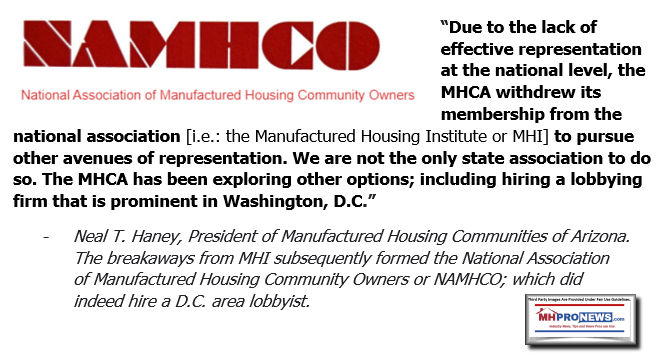

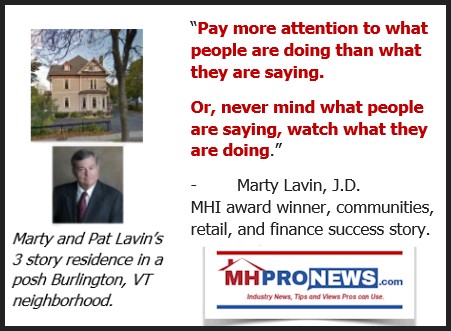
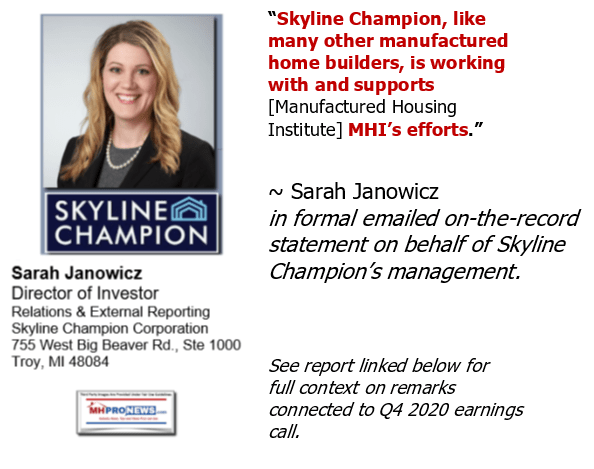
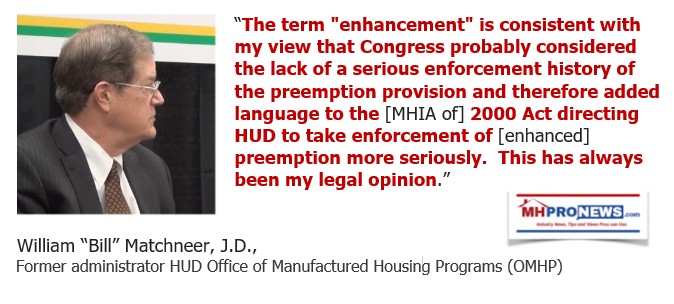
Yet, in the face of numerous facts, figures, and such statements, Tim Williams/OMHA says that MHI CEO Lesli Gooch is the best he’s every seen?
How does that square with the reality of declining shipments during an affordable housing crisis?
Can you spell, big disconnect? See the related reports linked above and below the byline, offers and notices to learn more.
“More Punitive Regulatory” Regime Looms Warns New Manufactured Housing Industry Insider

There is always more to know. Stay tuned with the runaway largest and documented number one most-read source for authentic manufactured home “Industry News, Tips, and Views Pros Can Use” © where “We Provide, You Decide.” © ## (Affordable housing, manufactured homes, reports, fact-checks, analysis, and commentary. Third-party images or content are provided under fair use guidelines for media.) (See Related Reports, further below. Text/image boxes often are hot-linked to other reports that can be access by clicking on them.)

By L.A. “Tony” Kovach – for MHProNews.com.
Tony earned a journalism scholarship and earned numerous awards in history and in manufactured housing.
For example, he earned the prestigious Lottinville Award in history from the University of Oklahoma, where he studied history and business management. He’s a managing member and co-founder of LifeStyle Factory Homes, LLC, the parent company to MHProNews, and MHLivingNews.com.
This article reflects the LLC’s and/or the writer’s position, and may or may not reflect the views of sponsors or supporters.
Connect on LinkedIn: http://www.linkedin.com/in/latonykovach
Related References:
The text/image boxes below are linked to other reports, which can be accessed by clicking on them.
Manufactured Housing Institute Warns Members – Pondering Legal Action, Insider Insights
“More Punitive Regulatory” Regime Looms Warns New Manufactured Housing Industry Insider
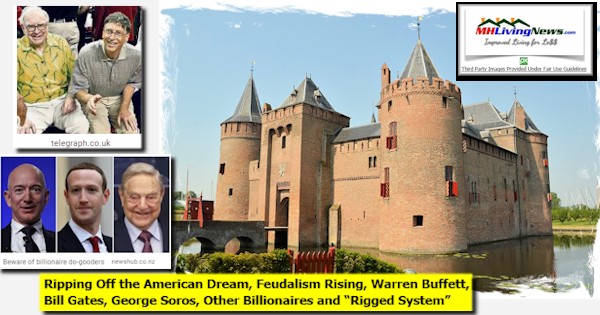
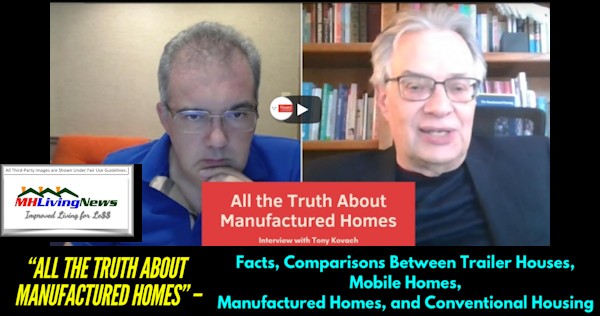
Frank Rolfe, MHU/RV Horizons Protest by MHAction; Nathan Smith/SSK/MHI Flashbacks?
Barriers to Entry, Persistence, and Exiting in Business, Affordable Housing, and Manufactured Homes
